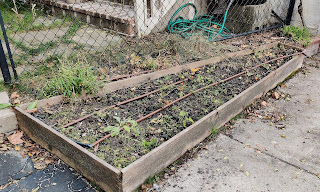The hard frost last week meant the end for our garden and for our zinnias, planted from the seeds from last Easter. We picked and ate all of our carrots – small and sweet, probably planted a little late. On Friday I spent most of the day taking out the garden and the zinnias and a few other annuals. The zinnias were tall! The ones in the backyard were like small trees and had to be chopped up before Jay could mow them into mulch. And the ones in the front flower boxes did not want to come out – it took a lot of wriggling and twisting and pulling to free them from the dirt.
The tomatoes too were a particular challenge. My working
with them renewed Luna’s interest in them and although she hadn’t eaten too
many all summer, it was hard to keep her away from the frost damaged fruit
falling as I wrestled with the plants. Tomatoes make her sick, but she forgets
this in the delight of being chased around the yard with one her mouth and the
excitement of being told “Drop it!”
The plants were huge and viney and supported by a lot of
different loops of twine connected to the back fence and the metal cages. Rogue
vines had grown on both sides of the fence. Again, there was a lot of chopping
and pulling involved and eventually two yard-bags full and tomato seeds
everywhere. The basil plants were just dry stalks but still smelled wonderful
as I added them to the bags.
I spent most of the day pulling and digging and cutting and I found myself giving thanks while I worked. Feeling deep gratitude for the zinnias – the bright and deep colors and blossoms had cheered us all summer in the yard and in bouquets inside. And gratitude for the tiny carrots, and the dusty smell of the basil, thinking of the pesto in the freezer for later this winter and all of the tomato basil recipes we tried this summer. And gratitude for the tomatoes – so good right from the garden and enough to share. I’m not sure I’ve felt thankful taking out the garden and flowers before.
I’ve been re-reading the book Braiding Sweetgrass by Robin Wall
Kimmerer and gratitude is a theme in the book. I think the Spirit is using it
to shape me – to help me be more thankful. One of the chapters in the book is
about the Thanksgiving Address of the Onondaga Nation, also known as the Words
that Come Before All Else. The Onondaga have a tradition of beginning every
gathering with a litany of thanksgiving that includes all of creation. I wonder
what it would be like if my first thoughts, my first words were gratitude. As I
was reading through the Thanksgiving Address, I found myself thinking of the
Psalm refrain ‘Give thanks to the Lord, for he is good, his love endures
forever.’ Kimmerer notes that the Thanksgiving Address reminds you that you
already have everything you need. ‘Give thanks to the Lord, for he is good, his
love endures forever.’



No comments:
Post a Comment